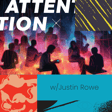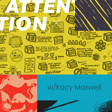Become a Creator today!Start creating today - Share your story with the world!
Start for free
00:00:00
00:00:01

From B2B Marketing to Media Company And Back Again w/Chris Stephenson
In this episode, Dan Sanchez talks to Chris Stephenson who is the VP of Marketing at MedRisk.
- Three major operational differences between content marketing and what a media company does
- The one major factor between content from a media company and marketing department
- What advice he would give his past self if he had to do it all over again.
Thank You For Listening to the Attention Podcast! Don’t forget to hit Subscribe or Follow us on your favorite podcast player so that you never miss an episode! If you want this podcast delivered to you via email, you can subscribe here: https://www.theirattention.com/p/subscribe/
The Attention Podcast is brought to you by Sweet Fish, the podcast agency for B2B brands.
- Three major operational differences between content marketing and what a media company does
- The one major factor between content from a media company and marketing department
- What advice he would give his past self if he had to do it all over again.
Thank You For Listening to the Attention Podcast! Don’t forget to hit Subscribe or Follow us on your favorite podcast player so that you never miss an episode! If you want this podcast delivered to you via email, you can subscribe here: https://www.theirattention.com/p/subscribe/
The Attention Podcast is brought to you by Sweet Fish, the podcast agency for B2B brands.
Transcript
Introduction to The Attention Podcast
00:00:03
Speaker
Welcome back to The Attention Podcast, where you learn how to gain and retain the attention of your buyers to build an audience.
Chris Stevenson's Marketing Journey
00:00:10
Speaker
I'm Dan Sanchez with Sweetfish, and today I interviewed Chris Stevenson, who is the VP of Marketing at MedRisk, about his journey from B2B marketing to media and back again.
Content Marketing vs. Media Companies
00:00:21
Speaker
In the episode, we talked about the three major operational differences between content marketing and what a media company actually does. We talked about the one major factor between content from a media company and a marketing department. We also talked about the advice he would give his past self if he had to do it all over again. All right, let's get into it.
00:00:47
Speaker
Chris, welcome to the show.
Advice for Past Self
00:00:49
Speaker
Thank you, Dan. Appreciate it. I'm honored to be here. So I wanted to dive right into the topic, and that is content marketing versus being a media company. What do you think the difference is? Yeah, so I'll start by saying, why does my opinion matter? Why am I qualified to make this distinction or at least have an opinion on the distinction?
00:01:09
Speaker
I spent 10 years in B2B marketing in the industry that I'm in now, went over the direct response world for a little bit, but then spent three or four years in an actual media company where we were creating a boatload of content, curating a boatload of content every day. And our goal was strictly to hit eyeballs, get people coming back, get them to read our posts, watch the videos, whatever it was.
00:01:37
Speaker
That's all we were trying to do. Then I came back into the B2B space. And so I'm familiar with each of these different worlds. And so I think there might be some nuance depending on how one defines content marketing. Some might say Disney, who's the biggest media company ever, they might say, well, they do content marketing because they create these movies and they use that to sell merch. But
Intent in Content vs. Media Companies
00:02:01
Speaker
here's how I draw the line with it.
00:02:04
Speaker
If the intent is to sell a product or service, then you're doing content marketing. If the intent is strictly to reach people and have them consume whatever it is, if that's the conversion point as opposed to a lead, a demo, a sales call, whatever it is, if you're focused on content
00:02:27
Speaker
consumption as the key metric and you just want those eyes and ears to keep coming back for more of it. That's what I say the distinction is between being a media company and doing content marketing. I don't think that means content marketing is the wrong way to do it. There's kind of a difference. Sure. And Disney probably does some content marketing, right? Yeah. Before I make content for the specific purpose of persuading you to buy a Disneyland ticket.
00:02:53
Speaker
It depends who you ask. It might just be one giant scam.
00:02:59
Speaker
Well, I think Disney, I love your definition. Actually, it brings a lot of clarity for me. And I've had conversations with a few marketers now and I've talked about like, how do you define the difference? Because there's so many shades of gray and I'm defining it around the intent, I think actually works pretty well. The intent to, for consumption and audience growth versus leading down the sales funnel are two different things. They kind of sit right next to each other. And of course, there's probably a gradation of them somewhere. And you can honestly do both remarkably well.
00:03:29
Speaker
And they would work better together. Yeah, yeah, totally. Especially in the B2B space. There's going to be that point where you want there to be the intent shift. Obviously, we can't just pay the bills on audience eyeballs in the B2B space if you're trying to sell, whether it's software or service or whatever it is.
00:03:59
Speaker
Yeah, you still got to meet the objective. So I'm really curious. I've not worked in a media company. Tell me, and for the audience, tell me a little bit about some of the major differences you saw in working for a media company. Now,
Pace and Volume in Media Content Creation
00:04:13
Speaker
I know you're making content mainly for consumption and to get people to view more content, right? So what are some of the practical differences? What does that look like in their day-to-day operations?
00:04:26
Speaker
From a day-to-day perspective, chaotic, really, is a lot more of the very fast... One of the main differences, I'll start here, is the volume of content, the quantity.
00:04:43
Speaker
of content that you're creating as a media company versus a marketer in an organization. Depending on where you are and the size of your team, I say, we want to create a blog post a week or one cornerstone piece of content every quarter and then repurpose that into all these different things. We would create content, test it out,
00:05:08
Speaker
Through through some media and other other ways to see is it really gonna hit and that would be what we published and so the volume of content that we're putting. Manpower behind and actually having people create the whole thing.
Content Quality vs. Production Quality
00:05:24
Speaker
and we might test it out and it might flop and we might test it out and it might get some teeth and we might publish it and it still might flop. So there's the quantity aspect of it. There's being able to kind of roll with the punches and stomach the day-to-day failures, if you will, of
00:05:49
Speaker
or two major distinctions apart from the obvious one that we already mentioned, which is how are you thinking? What are you talking about? Who are you talking about it for? I mean, that's probably the biggest one, like I said, is the product
00:06:04
Speaker
The content is the product, the product. Again, for us, we had our POV, our stance, and what we talked about. Beyond that though, it wasn't up to us and what we liked and what we wanted people to see. That was another thing that was interesting too that I frequently try to bring up to people when the topic of quality content comes up. Something I found is
00:06:32
Speaker
content quality and content production quality are not the same thing. We would test out videos of puppy and a kid playing together and then of some YouTuber going through this very deep explanation about why some people think cilantro tastes like soap and it would have all these beautiful, you know,
00:06:54
Speaker
graphics and everything would be like, oh, this is really interesting. People are going to dig this, put both of them head to head. And then what do you know, this cell phone video of a puppy and a kid takes off in these two million views. And at the end of this,
00:07:09
Speaker
like is that the kind of audience you're trying to cultivate, of course, and if it is, then great. But is that what keeps people coming to your site, your podcast, your Facebook page, your LinkedIn profile, whatever it is. The distinction between content production quality and content quality is something else that I try to bring back from that world. It's very easy to think that something has to have this absolute perfect amount of polish on it or
00:07:39
Speaker
Even reverse and that we just need a flyer that looks great and if it looks great then then it's going to get the job done well now not really. So yeah those are a few few different major distinctions.
00:07:55
Speaker
So a few differences I heard is one, you're putting out a quantity. Like it's quality, but you're still putting out a lot more content as a media company than you are as a content marketing department within a B2B company. Yeah, yeah. And I
Volume and Testing in Content Production
00:08:10
Speaker
think it might be skipping ahead here a little bit, but I think for any company who wants to kind of make that shift or any marketer who wants to dip their toes into that more,
00:08:20
Speaker
you have to be prepared to create media. You have to be ready to go do it and do a lot of it. I'm pandering, but I know what Sweetfish means. You guys churn out a lot of really good podcasts and content. I think from that, you probably learn a lot. You learn a lot faster, you know what people can do, and at the same time,
00:08:51
Speaker
movies or writing books, the timeline is going to look a little bit different. But if you're talking quick hit content, you can't put out one post a week and then be like, yeah, this is it. We're really hooking the audience in. There's no time to establish a relationship with them, establish trust, no time to understand what it is people truly engage with. If you put out 12 pieces of content in a quarter,
00:09:19
Speaker
if you're trying to get even somewhat scientific with it and understand what people want, it's going to take forever to collect that data.
00:09:32
Speaker
media cycles, whether it's trends and memes or news or stuff people need to know about in a short time span, that all cycles very quickly. So you have to be ready to jump and move, which is tough.
00:09:49
Speaker
So make more media, test it more. I love how you guys are actually testing out the ideas before you even publish it through paid media. And essentially, what was my last one? You have a different definition of quality, because you don't get to define quality, the audience defines quality.
00:10:04
Speaker
That's it. Yeah, I think you can take that definition of quality and you could say, did it do a good job of achieving whatever the objective is? Therefore, the quality of the way it did X is high, as opposed to, like I said, the production quality.
00:10:24
Speaker
this is interesting thing and look you want to have both right you want you want to have something that that looks good and whatever but i think a lot of people might want to hear elon musk talk over a tin can versus here's some random kid in like you know a poster to go so
00:10:42
Speaker
The substance matters. Now, if you can automate and smooth out a lot of the production process, production goes a little way. Sometimes people, even on TikTok, people prefer things that are down and dirty versus professionally made. I've seen YouTubers do split tests of their own content, one that they really made well done, same 60 second clip, and then one that they just do with their iPhone down and dirty and just record pretty much different content. Even the content's a little bit different. The content's simpler.
00:11:11
Speaker
versus the more detailed explanation of perfectly crafted shots. Now, the simpler one's working, at least on TikTok. Of course, every medium's a little different on YouTube. Higher quality's expected, but it's definitely totally different from a Marvel movie, right? Yeah. So different channels probably have different expectations as far as like what quality looks like. Yeah, there's a level of authenticity, and I know that's kind of a loaded term, but there's a level of authenticity we like to expect
00:11:41
Speaker
or like to feel, I guess, you know, when you're watching or reading something, whatever it is, and we can feel like we can relate.
00:11:52
Speaker
you know, holding up a cell phone, selfie video versus somebody with a camera crew, find them around, right? They're just like me. But, you know, I've found, you know, on LinkedIn as well. In a previous company,
Building B2B Audiences from Scratch
00:12:06
Speaker
we launched a podcast and, you know, 67 clip of an industry leader dropping a hot take.
00:12:14
Speaker
his camera might have been 720p. I don't know. It was between 480 and 720. It wasn't the best. And we also published very beautiful animated videos that cost like 10 grand to do. And this 60 second clip of an industry leader dropping this hot take
00:12:36
Speaker
It didn't have anything to do with us or our company or our product. It was about the industry. That blew every video we've ever posted out of the water. And maybe it did have some production quality. We had the banded, the classic micro video stuff. But beyond that, it was like real. And that goes a long way.
00:12:59
Speaker
Absolutely. The content, I mean, the substance of the content matters so much more than the production quality. The production quality matters still. You could even say it's a multiplier. Multiplier is a great, yeah, that's a great way to put it. Yeah, yeah, totally. It's not the essence of what you're trying to sell here. So like when someone's listening to all this, I know what they're thinking already. It's kind of like, oh my gosh, like that like volume at quality, like, and we're testing it, that's a freaking ton of work.
00:13:26
Speaker
Is it even realistic for a B2B company to take on that? And how have you implemented it now that you've learned what you learned? How are you taking some of those lessons learned into your new company? Yeah. So it's, I think it's baby steps. Like any B2B company that they can go out and be like, Hey, we're going to create 20 pieces of content every single day. And then, and then test it out and then actually distribute what
00:13:54
Speaker
all means. I think you do what you can with what you've got and being able to adopt definitely the mindset, adopt some of the principles as a starter. So there are companies who I think are like
00:14:11
Speaker
really pushing the boundaries, I guess you could say. A couple of them, Sweetfish, I mean, there's a ton of audio content coming from Sweetfish. Recorded Future, I don't know if, are you familiar with what they're doing over at Recorded Future? Absolutely.
00:14:27
Speaker
I hear about, in this show alone, I hear about them all the time. But I remember seeing, I heard about them from Chris Walker first. He interviewed their CMO, I think, on his show. And I heard about it and I was like, I was already thinking about this coming up show about audience growth. And I was like, ooh, somebody's doing it. And not just like acquiring it, like HubSpot did. Somebody's actually building it from the ground up. And I read all about it. And multiple people on the show have mentioned it already.
00:14:52
Speaker
Yeah, and so like one of the interesting things I found about it is, you know, so yeah, if you thought about we don't have to go into like the people they're hiring and the commitment and all that, but apart from, and maybe you found different, I don't know, but apart from like in the logo for the record, where it says, I think this is by recorded future.
00:15:12
Speaker
That's the
Bold Content Strategies
00:15:13
Speaker
only reference to the company that I could find. I couldn't find a link to their website. There was nothing about it. The product pitch is nothing. And that's such a bold move. When I saw it, I was like, man, that's so cool. That's such a bold move. And then, yeah, the hustle and HubSpot, you get all these companies who are buying the newsletters, which, I mean, it's certainly a way to go do it.
00:15:38
Speaker
And you do get the volume that way. You can do a lot of the testing that way by what people seem to be engaging with on the back end. So I think there are multiple ways to go about it. But yeah, those were a couple of examples that definitely come to mind of companies who are really doing it.
00:15:56
Speaker
But you have to have the right mindset, you have to have the right organizational buy-in for it. If you're in the kind of organization where somebody's like, okay, okay, well, if you can't launch a podcast without someone saying, well, what's the return going to be on this?
00:16:13
Speaker
then it's going to be tough for you to even amp that up further. In my previous company, when we launched the podcast, the chief sales and marketing officer and we had conversations about it and I was like, hey, look, I really want to do this, but I think we can only do it if we do it like this. He was on board, bought onto it for sure. Had the conversation gone differently,
00:16:41
Speaker
I'm not saying I wouldn't have done it. I'm going to die on that hill entirely for my career. But it would have been more difficult to get excited about a project like that. And I think for it to have the impact that it did have, having the organizational support for sure. And then you got to bring in people, the right people who are going to support creating this type of content, create this volume of content. Marketers can do it. Marketers can do it. The writers bring it in journey.
00:17:14
Speaker
future and see it happening in other places. Something that I found that I know you found intriguing when we talked before is, so when I was with this media company previously, and we stumbled on this by accident, we hired comedians. And so we were in Atlanta at the time, and there was kind of an up and coming comedy scene in Atlanta. And so whether it was somebody who
00:17:49
Speaker
on the team and I realized working with them that it was a huge win having them on the team and for a few different reasons. So if you think about what a comedian wants to do and how that relates to creating content.
Enhancing Engagement with Comedians
00:18:07
Speaker
Right? Their currency is laughs. Their currency is audience engagement. And they're used to this very rapid feedback. I have to deliver a message. I have to tell a story. I have to have a hook. And I have to do it in a very concise way. So my point goes across. And so you, the intended recipient of whatever this is, it hits you in the right part of your brain. So then you laugh.
00:18:38
Speaker
content. I realized like this is amazing because even when we were creating content that was a little more heartfelt, not necessarily funny even, there was that understanding of the emotion and the audience and what kind of paths you might need to take to really connect with somebody. So that was definitely
00:18:57
Speaker
you know, when we're talking about how you go about this. If you're in the part of the country or you can find some remote, you know, some comedians to work with, especially if you look at TikTok and look at what some people are doing on TikTok right now. I mean, that's, it's comedy. Like it's, it's sketch comedy, Todd Clauser.
00:19:24
Speaker
for sure. So, you know, don't sleep on comedians. They're a rare breed and also they can definitely help with some content.
00:19:33
Speaker
Funny's hard. Funny's so hard. And it takes a real skill. And it's almost like, you know how in sales you have to like, you kind of have to like beat the pavement for a long time and get so many rejections that you just kind of like develop a thick skin and therefore you can actually start to sell better. I feel like comedians have to go through the same path. And I found that a lot of comedians usually do it early in life and like learned how to really
00:19:57
Speaker
tweak it just right to be able to deliver it. And of course, a lot of them, the best ones go comedy club to comedy club to test out new material and honestly, really build a discernment for what's going to be funny. The same way marketers do, we look at headlines all the time and we get a discernment for what's going to connect, right? If you're good at social media, you know what two sentences to lead with. And you'll rewrite those first two sentences over and over and over again on LinkedIn at least to get people to click show and see more.
00:20:26
Speaker
On Twitter, it's all about the two sentences are probably the whole thing. But developing the discernment is difficult. Developing that gut feeling takes a lot of time. And they've learned how to do it with humor. And I love that. I think you guys are ahead, way ahead of the curve on that one.
00:20:42
Speaker
I'm sure more people will be doing it in the coming years. I don't know. I think it'll be a while before people do hire more comedians. I know James Carberry at Sweetfish has talked about hiring comedians before, but we haven't done it yet. We do have Emily Brady starting to get some pretty funny posts on her LinkedIn and TikTok content. Yeah, she's another one too. I was thinking that when you talk about the whole TikTok
00:21:14
Speaker
in our company, the industry we're in, it's not an intuitive, we're not marketing to marketers, we're marketing to sales people. You might consider it more of a legacy industry. It's insurance, workers' compensation. And at first, I was thinking like, no, TikTok,
00:21:35
Speaker
You know, I don't know if that's our thing we should be thinking about right now. But as time has gone on, I thought maybe we shouldn't just go like whole hog into TikTok. But what if we acted like we were going to?
00:21:51
Speaker
you know, like maybe our audience isn't on TikTok as a channel, but what if we approach some of the more traditional channels that we're on with the same style or the same, you know, energy and vigor? I mean, you know, when you look at like Emily and Todd and, you know, something I've seen both of them say is,
00:22:16
Speaker
Create it on tiktok sure like you know it might take off it might not but when you port that over to linkedin then like then it goes through the roof and you know i think i'm back to our conversation about like the media company.
00:22:32
Speaker
And how do you do it? How do you kind of get your boots on the ground with it? I think that's something that's important too. A lot of marketers, we like to repurpose and distribute and redistribute and get our channels in order. That's important to do. At
Repurposing Content Across Platforms
00:22:49
Speaker
the same time, being mindful of the repurposing and distribution rules. You can't just take one thing and plug it over the other, but you got to take advantage of what you got.
00:23:00
Speaker
So Chris, if you're past self, we're listening to this right now, before you did any of the media stuff, you're still working in B2B, what advice would you give yourself to implement some of the lessons you've learned in that company? That's a fantastic way to phrase it.
00:23:21
Speaker
of my future self instead of being like, shut up, dude. You don't know what you're talking about. Assuming Chris has some humility and is going to actually do it. Yeah. Yeah. So, you know, but I'll kind of beat this same drum about I would get my past self to change my mindset earlier and really understand that the like getting out of this
00:23:49
Speaker
Hey, sign up for our webinars so we can tell you about our product mentality and more toward a, hey, even if it is still a webinar, come sign up for this webinar so you can learn or see this really cool thing. Even
Beyond Clicks: Measuring Content Impact
00:24:02
Speaker
taking like that kind of slow burn change and the way that, you know, it's about creating the sticky content for the audience and then that's the win.
00:24:14
Speaker
And i think at the same time too i would go back to my past self and say hey and if this seems weird to you look at ways of measuring the best you can what kind of impact this has.
00:24:32
Speaker
And I think that might be a tricky place for a lot of marketers. It's like, how do you measure or attribute something like this? And in my world, there are two different ways that we look at it.
00:24:47
Speaker
There's through like the brand perception, like studies, we have like a studies done on the brand. How do you view the brand, positive perception? How do you see them? Which takes out all the, you know, counting clicks and conversion rates and things like that. And then something I did previously is I said, Hey, for us, our sales and account management team was they were very, very close to the customers. And I like to work with them almost as a, like they're a distribution channel for our content.
00:25:19
Speaker
The more I started getting good feedback from them, I said, hey, whoever forwards me the best email response they get from a client or a prospective client on this white paper we did or this blog post that I'm sending to you right now, we'll send you a gift card or whatever it is.
00:25:41
Speaker
When I noticed that the salespeople were sharing more of it, I was like, hey, this is moving in a better direction because they didn't feel like they were just pitching with what we shared. Then when we started getting feedback that said, hey, this really hits home, this speaks to me because I used to be in a specific role and I experienced these same things. Man, this is great. I'm going to share this around. That's it. That's the win.
00:26:08
Speaker
when you've got a client or a prospective client. And so it's a very qualitative way of measuring it, but a long way to say, hey, pass Chris, change the way you're thinking about this, and you can still show the impact it's having despite it not being something that you can really tangibly wrap your head around. And despite it being something that might defy conventional best practices,
00:26:37
Speaker
Like that's where I'd start. It's a good place to start if you can't change the mindset that none of the actions matter, right?
Closing Remarks
00:26:43
Speaker
Yeah. So Chris, thank you so much for joining me on the attention podcast. Where can people go to learn more about MedRisk and yourself online? Yeah, thanks. So MedRisk. MedRisk.net.com is our website on LinkedIn. It's the only social media app I have installed on my phone.
00:27:09
Speaker
You definitely can find me there. Fantastic. Again, thanks for joining me today. Thanks, Dan. Now let's talk about what caught my attention in this podcast. I think the thing that I'm going to be walking away with is the difference between a media company and a marketing department's ability to execute. And these are things that I've known intuitively, though it was really encouraging to hear Chris talk about it after having served some time at a media company and now coming back to marketing.
00:27:37
Speaker
That is the emphasis on quantity. A media company is judged by the amount of attention it can have, and the more content you can put out there, the more it can grow. The more at bats you get, the more swings you can take, the more you have a chance for something to go viral, but shoot, the more all the pieces will have an aggregate. That's why you can't just post one blog a week. Why posting so many more has a major effect.
00:28:04
Speaker
not only in Google, but also in your social network. Being able to post a lot more content infrequently is going to lead to you not only getting better, but also just getting more attention overall, because you can have more things to talk about. For those who are really active in consuming it, they can binge more episodes. And for those who only log in at certain times of the day, well, they're going to have more opportunity to see fresh content as they log in.
00:28:31
Speaker
The other part was how they test content. And it's something I hardly see any B2B marketing companies do, even with their own great content, even with our content is testing it, actually putting paid media behind something before you put it out and testing different headlines, approaches or way to position it.
00:28:47
Speaker
maybe testing it against different pieces of content to see which ones are going to perform better and then releasing the winner. That one's hard for me because I'm like, oh, that's a lot of time to be testing. And there's certain clips that I'm going to be testing and putting paid media behind for this podcast. But then testing out, like if I wanted to launch something as a post on LinkedIn,
00:29:05
Speaker
I'm like, do I want to put paid media behind it and then post it to LinkedIn? If I really wanted it to hit right, I would, but man, that's a big one to swallow, but still something I'm going to be thinking about figuring out how to streamline to implement myself. The last piece was letting the audience define what quality is. We can't ignore this.
00:29:26
Speaker
This is something we all need to be testing for, not testing through paid media, but just throwing out something that's not nearly as polished, that's very polished, and everything in between, and testing different things, even on social, to see what actually resonates. Is it because of the production quality, or is it because of what we're having to say?
00:29:47
Speaker
And honestly, there's times where I put out social posts that have sometimes an egregious typo in it and I just find it and edit it later as someone pointed out to me. But at the same time, if I weren't posting regularly, I wouldn't have the following that I currently have on LinkedIn. I almost wonder if there's a place for B2B companies and maybe typos is probably going too far. Maybe those need to be cleaned up more. But do we need to be pushing the envelope?
00:30:11
Speaker
and letting the audience give us the feedback either with no clicks and no views or by swarming the post with love or maybe even distaste. Either way, we need to let the audience decide. We need to figure out who the audience is and build raving fans from among them.
















